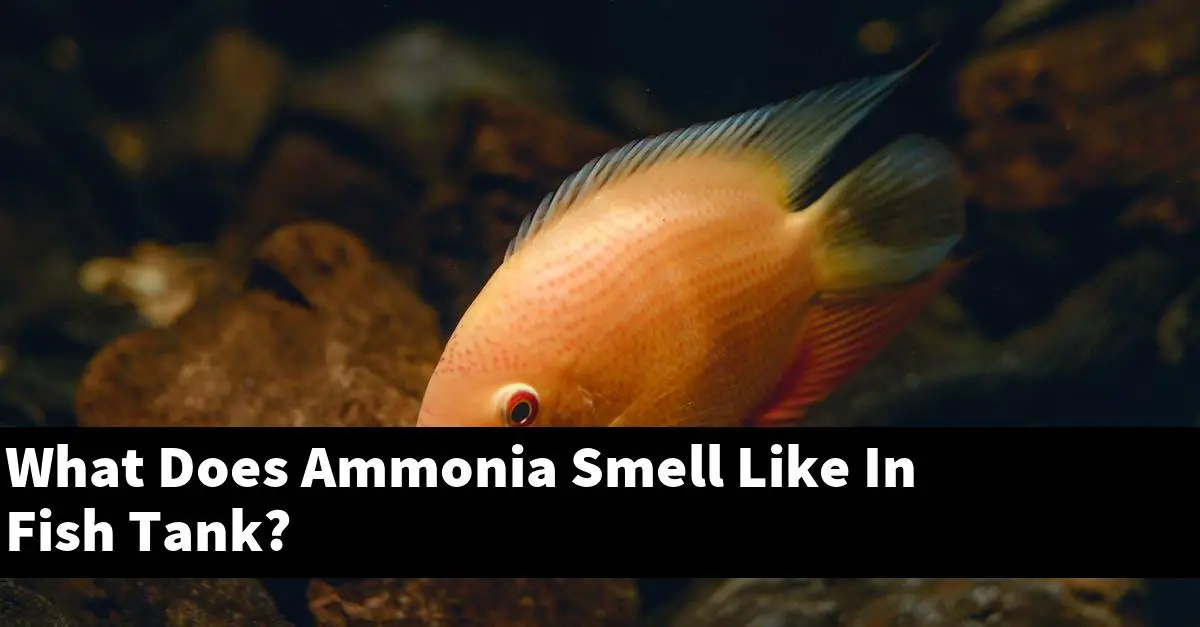Ammonia is a colorless gas with a strong, pungent odor. It is a major component of fish tank water and is produced by the breakdown of fish waste.
Ammonia can be toxic to fish and other aquatic life at high concentrations.
What does high ammonia look like in a fish tank?
High ammonia levels in a fish tank can cause fish to become lethargic and stop eating. If left unchecked, high ammonia levels can lead to fish death.
There are a few ways to test for high ammonia levels in a fish tank. One way is to use a ammonia test kit.
Another way is to look for signs of fish stress such as sunken eyes, protrusion of the lower jaw, and a lack of appetite. If high ammonia levels are detected, it is important to take steps to correct the problem.
How do I get the ammonia smell out of my fish tank?
Ammonia is a chemical that is found in both fresh and salt water. When fish excrete ammonia, it can cause a fish tank to smell like ammonia.
There are a few ways to remove the ammonia smell from a fish tank. One way is to add a biological filter that breaks down the ammonia.
Another way is to add a carbon filter that removes the ammonia smell.
What should a fish tank smell like?
A fish tank should smell like water, ammonia, and fish.
How do i stop my fish tank from smelling?
There are a few things you can do to try and stop your fish tank from smelling. You can try scrubbing the tank walls and floor with a mild cleaning solution.
You can also try adding a filter to the tank that will help trap the smells. You can also add some fresh water plants to the tank to help filter the air.
Can a smelly fish tank make you sick?
The answer to this question is a little complicated, as it depends on the particular fish and tank setup. Generally speaking, however, fish tanks can contribute to allergies and other respiratory problems in people if the water is dirty or the fish are producing too much ammonia.
In extreme cases, inhaling fish tank fumes can even lead to serious respiratory problems, such as asthma.
What is a fish tank supposed to smell like?
A fish tank’s water should always have a neutral smell, and the fish themselves should not produce a strong odor. If the smell becomes too strong, it may be a sign that the water is contaminated with pollutants or the fish are not being properly cared for.
Why does my aquarium smell like sulfur?
Sulfur is a component of many organic substances, and when these substances break down they can release sulfur dioxide. Sulfur dioxide can be released when the water is heated, when fish waste is decomposing, or when plant roots decompose.
When these substances are combined, they form sulfur trioxide. Sulfur trioxide is a gas and when it is released into the air it can cause a sulfur smell.
What does fish poop smell like?
Fish poop smells like ammonia and fecal matter. Ammonia is a byproduct of the fish’s digestive process and is released as the fish eats.
Fecal matter is the undigested food the fish has eaten.
What are signs of ammonia in fish tank?
Ammonia is a toxic gas that is released from fish tanks when the water is not kept at a high enough temperature. Ammonia will cause fish to become sick and die.
Some of the signs of ammonia poisoning in fish are:
-Sickness
-Rapid breathing
-Reduced activity
-Lethargy
-Death
Fish tank smells after 2 days?
Fish tanks usually have a strong and pungent odor after a few days. This is due to the fish waste and ammonia that build up in the tank.
The smell will eventually dissipate over time if the tank is properly maintained.
Fish tank smells like fart?
Fish tanks can sometimes smell like fart. This is because fish produce methane, which is a gas that is produced when the fish digest food.
The gas can be smelled when the tank is empty or when the fish are swimming around.
Conclusion
Ammonia in fish tanks typically has a strong, pungent odor. Ammonia is produced by the breakdown of organic matter in the water, and it can be toxic to fish and other aquatic animals in high concentrations.
Ammonia levels should be monitored closely in fish tanks to ensure the safety of the inhabitants.


